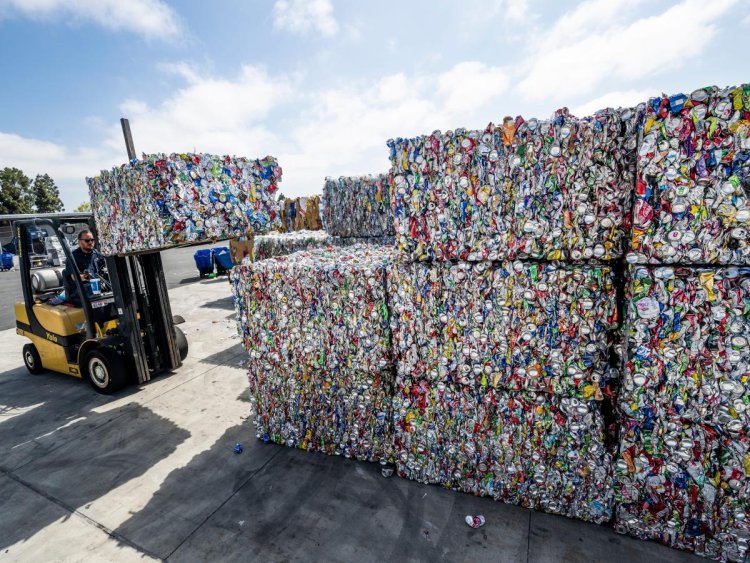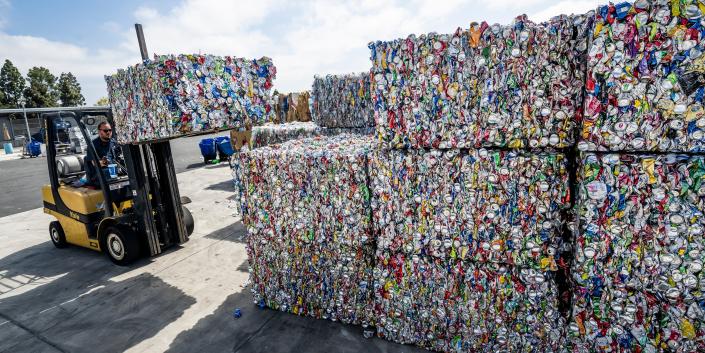One family pocketed $7.6 million by taking cans and bottles from Arizona and recycling them in California. That's fraud, prosecutors say.
A recycling technician loading an 800-pound block of compressed aluminum cans at OCC Recycling Center in Costa Mesa, California, on July 14, 2022.Paul Bersebach/MediaNews Group/Orange County Register via Getty ImagesProsecutors say a family that made $7.6 million from recycling defrauded the state of California.The family, based in Southern California, is accused of recycling materials purchased in Arizona.More than $1 million worth of "illegally imported beverage containers" was found, a statement says.A California family that earned millions of dollars just by recycling cans and bottles has now been accused of multiple felonies that could lead to years behind bars.In a felony complaint filed this month, state prosecutors charged eight family members in Riverside County with defrauding the state by importing used bottles and cans from Arizona — some 178 tons in 8 months — and recycling them in California.The recycling operation earned the family $7.6 million, according to a statement


Prosecutors say a family that made $7.6 million from recycling defrauded the state of California.
The family, based in Southern California, is accused of recycling materials purchased in Arizona.
More than $1 million worth of "illegally imported beverage containers" was found, a statement says.
A California family that earned millions of dollars just by recycling cans and bottles has now been accused of multiple felonies that could lead to years behind bars.
In a felony complaint filed this month, state prosecutors charged eight family members in Riverside County with defrauding the state by importing used bottles and cans from Arizona — some 178 tons in 8 months — and recycling them in California.
The recycling operation earned the family $7.6 million, according to a statement from the office of California's Attorney General, Rob Bonta. Investigators also found a stash of "illegally imported beverage containers" worth another $1 million.
When someone purchases a plastic or aluminum bottle in California, they typically pay an extra 5 to 10 cents in "California Redemption Value," or CRV, which the consumer can get back by returning the items to one of the state's more than 1,200 recycling centers. Arizona has no such program.
"California's recycling program is funded by consumers, and helps protect our environment and our communities," Bonta said. "Those who try to undermine its integrity through criminal operations will be held accountable."
In the criminal complaint, prosecutors accused family members of unlawfully conspiring to commit grand theft and defrauding the California recycling program on a "chronic and ongoing basis" by seeking reimbursement for out-of-state containers and containers that had already been redeemed within California.
Felony grand theft in California is punishable by up to three years in state prison. Redeeming out-of-state containers to the degree the family is accused could increase the sentence by another three years.
Court documents did not identify an attorney for the defendants, who have not been convicted of a crime.
Last year, six people were charged in a similar Arizona-to-California recycling operation that prosecutors said netted more than $10 million by fraudulently redeeming more than nine tons of empty beverage containers.
At least 93 people in California were convicted of recycling fraud between 2010 and 2019, according to a report by the nonprofit Consumer Watchdog.
Have a news tip? Email this reporter: [email protected]
Read the original article on Business Insider
What's Your Reaction?






















